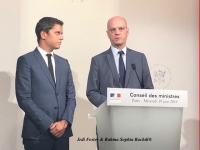Politics
G7 IS TO PUT GENDER EQUALITY AT THE CENTER OF EDUCATION SECTOR PLANNING
GENDER AT THE CENTER INITIATIVE- CGI

G7 Biarritz Banner (Source: G7 Canada 2018)
USPA NEWS -
The G7 Gender at the Center Initiative (GCI) is a chance to mobilize the necessary political leadership and expertise at country level to rapidly step up progress in gender equality, in and through education. “GENDER AT THE CENTER INITIATIVE “ : Putting gender equality at the center of education sector planning
Gender inequality persists around the world, and education continues to reflect these inequalities. Despite significant gains, girls, and particularly adolescent girls, continue to be left behind. In Sub-Saharan Africa, 52 million girls and young women are still missing the chance to go to school and are facing significant barriers to their education. Increased school enrollment of girls is necessary, but African Union members have recognized that it is not sufficient for achieving gender equality in education outcomes. For sustainable change, a strategic shift is needed to move the focus beyond gender parity in numbers, to a broader focus on how the education system as a whole can advance gender equality ““ in areas such as safe learning environments, teacher education and practice, curriculum and materials development, leadership and administration.
Gender inequality persists around the world, and education continues to reflect these inequalities. Despite significant gains, girls, and particularly adolescent girls, continue to be left behind. In Sub-Saharan Africa, 52 million girls and young women are still missing the chance to go to school and are facing significant barriers to their education. Increased school enrollment of girls is necessary, but African Union members have recognized that it is not sufficient for achieving gender equality in education outcomes. For sustainable change, a strategic shift is needed to move the focus beyond gender parity in numbers, to a broader focus on how the education system as a whole can advance gender equality ““ in areas such as safe learning environments, teacher education and practice, curriculum and materials development, leadership and administration.
THE GENDER-RESPONSIVE EDUCATION SECTOR PLANNING APPROACH--------------------------------------------------
Education sector planning is a mobilizing exercise, led by a country´s education ministry and other ministries with responsibility for the education sector and involving a wide range of actors in defining the future of a country´s education system. Education sector plans (ESPs) use evidence to express the country vision for what is to be achieved, what resources will be allocated from national and, if relevant to the system, sub-national budgets, how results will be monitored, and how implementation will be achieved.---------------------------------------------------------------------------------------------------------------
The concept of Gender-Responsive Education Sector Planning (GRESP) has been developed to support nationally-led, -owned, -financed processes for the development of sectoral strategies which more effectively address gender considerations. Several international organizations are working with countries to build government capacity to implement this approach: the United Nations Girls´ Education Initiative (UNGEI), the UN Children´s Fund (UNICEF), UNESCO International Institute for Educational Planning (UNESCO-IIEP) and the Global Partnership for Education (GPE). However, more needs to be done to further support GRESP and translate these into results which are monitored and evaluated.
WHAT NEEDS THE CGI WORK TO ACHIEVE ?-----------------------------------------------------------------------------------------
- Enhanced implementation of systemic approaches to achieve gender equality in education systems by supporting governments in filling technical gaps and implementing gender-based budgeting, by enabling the strong leadership of ministries of education to incorporate attention to gender equality, including addressing barriers such as violence and harmful practices, into sector planning, implementation, monitoring and reporting. In parallel, it will engage with local leaders, community and grassroots organizations, teachers´ organizations, the private sector, and civil society movements, which can work locally on putting an end to discriminatory and harmful practices and beliefs.
- Increased cross-sectoral policy dialogue and coordination among ministries responsible for gender equality and education.
- Stronger data, monitoring and accountability for gender equality results in and through education.
The Gender at the Center Initiative´s main objectives
Supporting the Mainstreaming of Gender Equality in Planning, Implementation and Monitoring 2 July 5th 2019, Appendix to the ministerial communiqué
The objective is to better mobilize political support from G7 Member States and other key partners to support countries in the definition, implementation, monitoring and evaluation and reporting of country-owned interventions, strategies and plans to achieve gender equality in education. G7 members will support advocacy for incorporation of gender equality at all stages of the sectoral dialogue within countries and specifically make the case for girls´ education at global level when relevant. To do so, the Initiative focuses on a selection of countries that choose to participate and to demonstrate their own commitment to gender equality. They can benefit from financial and technical resources provided through the GCI.
The Initiative, as an alliance of partners, intends to work to enhance:
- Country ownership, financing and prioritization of selected policies and strategies;
- Political and public support for gender equality policies and strategies in education;
- Quality, availability and use of sex-disaggregated data and evidence;
- Context-sensitive identification of appropriate policies and strategies, and their implementation;
- Coherence and coordination among all stakeholders supporting gender equality in education;
- Monitoring and evaluation frameworks to better monitor progress on reducing gender inequality.
SUPPORTING PARTNERS AND LINKAGES WITH EXISTING EFFORTS---------------------------------------------------------
The Gender at the Center Initiative builds on existing efforts and does not seek to create new mechanisms, working within existing structures and strengthening coordination between them. UNGEI is working within a strong partnership of organizations committed to accelerating action on girls´ education and gender equality, with a focus on policy advocacy efforts. Dedicated GCI resources will enable UNGEI processes and partnerships to further the objectives of the Initiative, including enhanced coordination with UNICEF, UNESCO, the GPE and CSOs. The International Labour Organization (ILO) will also be consulted.----------------------------------------------------------------------------------------------------------------------------
The GPE´s partnership model at the country level provides a powerful opportunity to support country ownership to drive system-wide changes for gender equality. The GCI aims to build on existing national processes, including the ongoing work of LEGs led by ministries of education, to support the drafting and implementation of GRESPs and help creating a shared vision to achieve gender equality in education.
The GPE Secretariat proposes to work with a sub-set of governments that choose to participate in the GCI, notably to assess ESP´s development grants applications to ensure they include technical assistance and financial resources for incorporation of a strong gender equality perspective, to strengthen the explicit inclusion of gender questions at each stage and to work with GCI technical experts and LEGs to strengthen evidence-based gender-related analysis during sector reviews.
To better inform planning and monitoring, the UNESCO Institute for Statistics (UIS) will strengthen sex-disaggregated data, compliant with international standards and ensuring cross-country comparability. The IIEP would feed more accurate and reliable gender-related data into education sector analyses.
How does the Gender at the Center Initiative (GCI) work?
The Initiative will be coordinated by UNGEI. Following an outreach process to identify where countries are in their planning cycles and entry points for improved incorporation of gender equality integration, in line with GPE processes, a dedicated technical team of experts, based at the UNESCO-IIEP office in Dakar, will work closely with education ministry officials and GCI partners. The technical support will be country-specific, responding to country demand and depending on available national expertise in the ministries and through members of LEGs. Experts will be a mix with expertise in: gender equality, education analysis and planning, financing, and monitoring and evaluation, organizational change and reform in national systems. The Initiative will track its results through ongoing monitoring and periodic reporting. Detailed draft terms of reference for the initiative would be drawn up following the G7 meeting in July 2019. Source French Min sitter of Foreign Affairs, G7 Presidency
G7 Education Gender Reducing Violence Concrete Actions On Inequalities Elysee Palace Unesco Biarritz Ministers Rahma Sophia Rachdi Jedi Foster
Liability for this article lies with the author, who also holds the copyright. Editorial content from USPA may be quoted on other websites as long as the quote comprises no more than 5% of the entire text, is marked as such and the source is named (via hyperlink).







